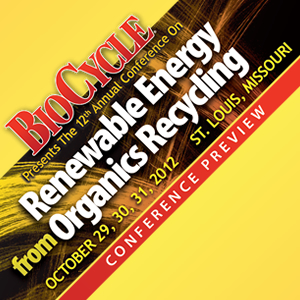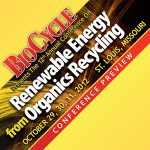BioCycle’s 12th Annual Conference in St. Louis, Missouri focuses on optimizing management of operating facilities, strategies for new project and product development and building biogas markets.
Nora Goldstein
BioCycle September 2012, Vol. 53, No. 9, p. 35
The Agenda for BioCycle’s 12th Annual Conference on Renewable Energy From Organics Recycling (see pages 15-18) reflects this progress, as well as emerging opportunities. Participants will learn about the connections between renewable energy and organics recycling from Karl Brooks, Administrator of U.S. EPA Region 7, and biodigester market developments from Allison Costa of AgSTAR. A sampling of Concurrent Session presentations on Monday, October 29 and Tuesday, October 30 are provided in this roundup. The Conference Preview report ends with the Renewable Energy Marketplace, a directory of exhibitors participating in the Trade Show.
Session Overviews
Digester Management: Part of optimizing management of anaerobic digesters is recognizing vulnerabilities and how to avoid them. Two sessions focus on digester system optimization and management. The first starts with a presentation by Dana Kirk of Michigan State University (MSU) and Joe Tesar of Quantalux, LLC. MSU received a grant from the U.S. Department of Agriculture to conduct an analysis of digester failures. Six areas were analyzed: Site planning/ design; Engineering; Construction and equipment selection; Biogas utilization; System controls; and Operation, including management and communications. Findings of the analysis will be reported. Second, Bernie Sheff of UTS Residual Processing, Inc. provides a case study of a system failure analysis and what troubleshooting it took to get the digester back on track. A session organized by Dennis Totzke of Applied Technologies, Inc. gets into more of the nitty-gritty of managing AD systems. Totzke focuses on how to achieve profitable performance. Fred Roland of Agresource, Inc. discusses evaluating substrates for acceptable digestability. There also are case studies of two dairy digesters.
Codigestion At WWTPs, Universities: What “exotic feedstocks” work for codigestion, and which ones can be problematic, will be the main topic of discussion in a presentation by David Henderson, Utility Director with the City of West Lafayette (IN) WWTU and Luke Werner of Kennedy/Jenks Consultants. David Parry of CDM Smith speaks next in this session. He has been leading a multiphase research project for the Water Environment Research Foundation (WERF) on codigestion at WWTPs. The presentation covers assessing organic waste management options, economics of codigestion and organic loading rates for digestion and stability. In a session on Biogas Utilization, findings from a national data collection project on wastewater treatment plant biogas will be provided by Yinan Qi of Black & Veatch. Data includes whether or not WWTPs surveyed are accepting outside substrates such as FOG and food waste into their digesters.
University codigestion systems are covered later in the conference. In September 2011, Michigan State University began operating a 225,000-gallon plug flow digester that is processing dairy manure mixed with wood shavings, poultry eggs and food waste from campus dining facilities. Louis Faivor of MSU and colleagues have been investigating how well a plug flow digester operates with food waste as a primary feedstock and if gas production or quality is negatively impacted due to lack of mixing (the findings are positive). A first-year analysis of the dry fermentation codigester at the University of Wisconsin-Oshkosh is being presented by plant operator Brian Langolf of UWO. Donna Barlow Casey of Vermont Technical College will report on developments with design of that campus’ codigester. The facility is being permitted as a farm digester, with at least 51 percent of the feedstocks coming from VTC’s farm operations. Food processing residuals will be added as a substrate.
Biogas Utilization And Cogeneration/Heat Recovery: Joanna Underwood, director of Energy Vision, is one of the leading advocates for utilization of anaerobic digester biogas as a renewable fuel. She will share her insights into building market share for renewable CNG. Chris Voell, who recently joined Cornerstone Environmental’s BioCNG subsidiary, discusses opportunities for small-scale fueling systems (50, 100, 200 cfm) that produce between 200 and 1,000 gasoline gallon equivalents/day.
Four presentations will be given on cogeneration systems and heat exchange. Speakers are covering fundamentals of heat exchange with internal combustion engines (David McCallum, GE Energy), external heat exchangers in AD systems (Susan Hammock, Alfa-Laval), internal heat exchangers (Meik Schubert, BRUGG) and a project case history (Kevin Jankowski, Applied Technologies).
Biomass And Biofuels: Several presenters are addressing the topic of integrated biorefineries and sustainable energy crops. William Orts, USDA ARS-WRRC, reports on his laboratory’s development of biorefinery strategies applicable in the Western U.S. to convert agriculturally-derived biomass feedstocks and/or municipal solid wastes into value-added products including biofuels, bioenergy and biopolymers. Wei Liao of MSU describes a novel integrated farm-based biorefinery using a combined feedstock of animal manure and other crop residues to produce ethanol, methane, and other value-added products. The system includes three major components — anaerobic digestion, algal cultivation, and bioethanol production. Nathan Young of the University of Iowa’s Flood Center has been investigating use of dedicated energy crops on chronically flooded land. The university foresees the possibility that traditional row cropping in flood-prone areas will be harder and harder to insure, therefore planting perennial energy crops such as poplars might provide an income alternative to those producers and help mitigate the impacts of flooding and help improve water quality.
These highlights barely touch on the full breadth and depth of BioCycle’s 12th Annual Conference on Renewable Energy From Organics Recycling in St. Louis. There are sessions dedicated to farm digestion, food waste sourcing, community energy systems, utility perspectives, legislative and regulatory developments, financing and revenue opportunities, markets for digester by-products and European AD experiences.











